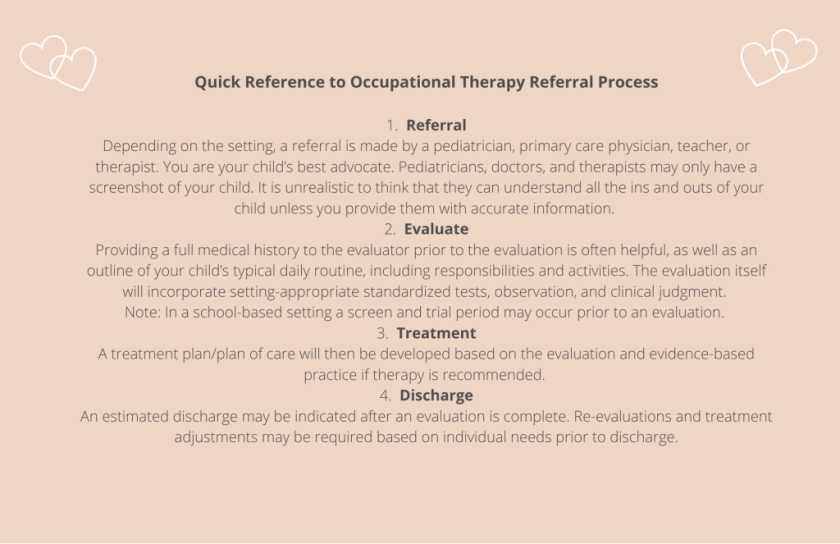
Shout out to all the occupational therapists (OT) dedicated to helping individuals to live their best lives. Occupational therapy is the only profession that helps people throughout their lifespan to complete tasks that are meaningful to them through the therapeutic use of daily activities, also known as occupations.
In observation of Occupational Therapy Awareness Month, and due to our focus on children and their parents here at THE NURTURE NOTEBOOK, we look forward to providing you with a brief overview of occupational therapy in pediatric settings.
Occupational therapists who specialize in pediatrics focus on the birth to 21 year old population. We work with a large variety of diagnoses with some of the most common being autism, down syndrome, motor disorders, intellectual disabilities, cerebral palsy, and attention-deficit/hyperactivity disorder. We work with children on their activities of daily living (ADL’s), instrumental activities of daily living (IADL’s), and any skill that interferes with participation in these tasks or other age-appropriate occupations (i.e. play, education). These may be fine motor, visual motor, or gross motor skills, sensory integration, attention to task, regulation of behavior and emotions, and executive functions.
One thing all pediatric settings below have in common is that we attempt to utilize play in purposeful ways to enhance your child’s development and abilities. Play is your child’s occupation. At different stages, life-skills and academics also become a critical part of their occupation.

Early Intervention (EI)
Occupational therapists in the Early Intervention environment work with children ages birth to 3. We see children in their natural environments, such as their home, or a grandparent’s house, and community settings, such as their day-care, preschool, and parks. We encourage parents to be involved in the occupational therapy sessions and work towards developing skills important to each individual family, trying to embed helpful tips and activities into daily schedules and routines to make carryover realistic. We often work with children on the skills required to complete their daily activities such as play, social, sensory, motor, dressing, and feeding skills. Referrals may be made by your child’s pediatrician or you may also directly contact EI and request testing. Evaluators will identify if your child has a 25% delay or more and how this delay impacts their ability to function in their natural environments. The earlier a child receives help, if needed, the better the outcome.
To find contact information for EI in your state refer to this CDC link for state by state information.
https://www.cdc.gov/ncbddd/actearly/parents/states.html

School-based
In the school system, occupational therapists work with students who are identified as having a disability that impacts their success in the academic environment. Treatment is educationally-focused. Unlike outpatient OT, we only address concerns if they are interfering with school participation, otherwise, outpatient is more applicable. We are often found working on visual motor and fine motor skills that impact areas such as handwriting, sensory and attention concerns impacting ability to participate in their school setting enabling them to learn efficiently. Referrals are typically made by your child’s teacher or another therapist based on your child’s school team’s concerns.
https://www.aota.org/Practice/Children-Youth/School-based.aspx

Outpatient Clinic
Outpatient occupational therapists work in a clinic setting with a broad variety of disabilities. We focus on various skills from sensory integration, activities of daily living (i.e. feeding, dressing) to fine and visual motor skills impacting success in daily functioning. Unlike schools, outpatient pediatrics does not require academic difficulties to qualify, rather a 25% delay in the specific standardized testing they are using. Referrals are typically provided by your child’s pediatrician based on your child’s development and both your and your pediatrician’s concerns.

Neonatal Intensive Care Unit (NICU)
Occupational therapists are also found in the NICU working with newborns who have significant medical needs. Common areas we work on in this setting are bonding, daily care, feeding, positioning, exploration of environment and play, and caregiver training. Referrals are typically made by doctors on staff. An OT evaluates your baby to identify their occupational needs while in the hospital and then provides you with guidance if OT is recommended once your baby leaves the hospital.

Inpatient
An inpatient OT is typically found in a children’s hospital and often works on recently diagnosed disabling conditions, such as burns, cancer, and spinal cord injuries. We may occasionally see a child with long existing conditions when admitted into the pediatric intensive care unit (PICU). Referrals are typically made by doctors on staff. After a referral an OT evaluates your child’s occupational needs in the hospital setting. If OT is warranted a treatment plan is developed to address the specific areas of need for your child to participate in daily activities.

Note: Children today are stressed. Occupational therapists consider the mental health and wellness of children because we are holistically based and look at an individual as a whole. Our role is also to help identify stressors and their barriers, identify coping strategies, and plan how to incorporate them into daily life. We work on the development of interpersonal and social skills, as well as provide guidance in finding other therapies that may help your child dependent on their specific needs (i.e. trauma-focused cognitive behavioral therapy, support groups, local psychiatrist, psychologist, and counselors). You don’t have to do this alone. Being a parent is hard, and we encourage parents to tap into all available resources for support.

I’ve always felt as if being an occupational therapist hasn’t necessarily made me a better mom because being a mom is personal and emotional. So, simply being a pediatric specialist does not make us immune to the challenges of parenting. I do feel though, that through my own personal experience and growth, being a parent has helped me to look at the children I work with from the unique perspective of being both a parent and a therapist.

Love,
Your Nurture Notetaker
Kim Bandi, OTR/L
Founder of The Nurture Notebook